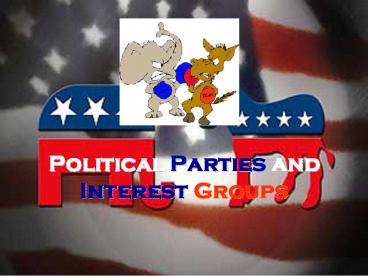Political Parties and Interest Groups - PowerPoint PPT Presentation
Title:
Political Parties and Interest Groups
Description:
Political Parties and Interest Groups – PowerPoint PPT presentation
Number of Views:351
Avg rating:3.0/5.0
Title: Political Parties and Interest Groups
1
Political Parties andInterest Groups
2
What is a political party?
A political party is a group of people who
organize in an effort to control government and
influence government policies through the winning
of elections and the holding of public office.
3
What do political parties do?
- Nominate candidates for public office
- Help to organize and operate the government
- Educate the public and energize their supporters
- Act as the loyal opposition (if not
in power)
4
Two-Party System
System in which two political parties dominate
the voting and win virtually all of the elections
at every level (national, state, local). (As
opposed to a multiparty system in which three or
more political parties compete for control over
the government either alone or in a coalition
with other parties.)
5
American Political Parties Rap
6
German elections for the Bundestag
2009 Party First Votes
Total Seats Christian Democratic
Union/ 17,047,674 39.4 239 Christian Social
Union Social Democratic Party of Germany
(SPD) 12,079,758 27.9 146 Free
Democratic Party (F.D.P.) 4,076,496 9.4
93 The Left (DIE LINKE) 4,791,124 11.1
76 Alliance 90/The Greens (GRÜNE) 3,977,125
9.2 68 Pirate Party of Germany
(PIRATEN) 46,770 .1 0 National
Democratic Party of Germany (NPD) 768,442
1.8 0 The Republicans (REP) 30,061
.1 0 Others 430,550
1.0 0
7
Third Parties (Minor Parties)
In the past, no third party has ever won the
election for President. Though the Republican
Party was relatively new in 1860, the other
major party prior to the Republicans, the
Whigs, had not run a candidate for President
since 1852. Here are some of the more
successful attempts by third parties to run for
President.
Several third parties or minor parties exist
in the United States today. Can you think of any
examples?
8
Here are some of the third parties that exist
in the U.S. today
- The Constitution Party
- The Green Party
- The Libertarian Party
- Communist Party USA
- Socialist Party USA
- Reform Party
- Prohibition Party
9
Here are some of the top performances by third
party candidates in U.S. Presidential election
history
10
Election of 1912
11
Election of 1948
Strom Thurmond married former Miss South
Carolina Nancy Moore when he was 66 (she was 22
at the time). Together they had 4 children, the
last born when Thurmond was 74.
Strom Thurmond served in the U.S. Senate for 48
years until he was over 100 years old.
12
Election of 1968
13
Election of 1992
Ross Perot received about 19 of the vote
overall, but he did not win any states outright.
United States presidential election, 1992 United States presidential election, 1992 United States presidential election, 1992 United States presidential election, 1992 United States presidential election, 1992
November 3, 1992 November 3, 1992 November 3, 1992 November 3, 1992 November 3, 1992
Nominee Nominee Bill Clinton George H. W. Bush Ross Perot
Party Party Democratic Republican Independent
Home state Home state Arkansas Texas Texas
Running mate Running mate Al Gore Dan Quayle James Stockdale
Electoral vote Electoral vote 370 168 0
States carried States carried 32 DC 18 0
Popular vote Popular vote 44,909,806 39,104,550 19,743,821
Percentage Percentage 43.0 37.4 18.9
14
Perot/Stockdale Videos
Video link for Perot/Stockdale SNL
15
Why do third parties run?
- To win public support for issues that are
important to them (womens suffrage, balanced
budget, environmental issues, etc.) - To play a spoiler role (Roosevelt in 1912,
Nader in 2000) - They may hope to eventually become one of the
major parties (Republicans in the 1850s)
16
Interest Groups
?An interest group is an organization whose
members believe in a common cause and try to
influence public policy to benefit that cause.
17
What are the differences between parties and
interest groups?
- Political parties nominate candidates (try to win
elections), but interest groups do not. - Parties focus on controlling government while
interest groups try to influence the government
leaders and their decisions. - Parties typically focus on a wide array of issues
while interest groups focus on a narrow set of
issues (sometimes only one).
18
Political Action Committees (PACS)
- What an organization (linked to an interest
group, corporation, labor union, etc.) formed to
collect money and make contributions to political
candidates. - Contribution limits PACs can give up to 5,000
to any candidate for federal office per election
19
Super PACS
- Recently, we have seen the rise of so-called
Super PACs which can spend unlimited amounts of
money as long as they do not coordinate directly
with a candidate or political party
20
THEEND































